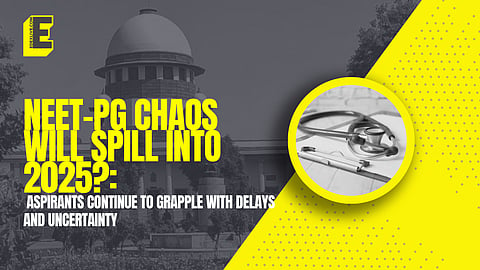

Even as we step into 2025, the chaos surrounding the National Eligibility cum Entrance Test for Postgraduate (NEET PG) continues unabated.
With court hearings delayed and counselling processes riddled with discrepancies, medical aspirants find themselves in a state of confusion and anxiety.
The repeated disruptions in exam timelines and the uncertainty surrounding court decisions have taken a severe mental toll on students, raising serious questions about the management of one of India’s most competitive medical entrance exams.
Dr Nikita Nanwani, MD (Radiodiagnosis), Founder & CEO, Medsynapse Academy and an educator at PrepLadder, pointed out the cascading effects of this mismanagement on students.
According to her, the constant changes to exam schedules, such as postponements and preponements, have left students sceptical when it comes to trusting the declared dates of examinations.
Referring to last year’s experience, she said, “In 2024, we saw exams being postponed and, in some cases, even cancelled at the last minute. Everyone remembers how it was called off the night before it was scheduled. This not only disrupts students' preparation but also impacts their focus and mental health.”
The issue is not limited to exams alone. Dr Nanwani highlighted how the counselling process, which is meant to provide clarity to students, has instead become a source of confusion.
“Even after results are announced, counselling gets delayed. This year, the tentative date for NEET-PG 2025 is June 12, but students are understandably sceptical after the chaos of previous years,” she added.
Mental toll and calls for reform
The uncertainty surrounding exam schedules and counselling processes has left many students unsure of whether to wait for court decisions or start preparing for the next year.
Dr Nanwani emphasised the need for structural reforms, including the creation of expert judicial panels to address such issues. “There is no expert panel that understands the journey of a medical student. Decisions take far too long, and students risk losing a year or even their admission due to this chaos,” she said.
Looking at the long-term implications, Dr Nanwani warned about a potential brain drain from the medical field.
She noted that increasing numbers of doctors are opting to work abroad due to the stressful and unsafe conditions in India. “What was once common among engineering students who chose to head to the IT (Information Technology) sector abroad, is now becoming a reality for medical professionals. Doctors don’t want to practice here because of the issues they face during residency and beyond,” she explained.
Legal delays and the role of the courts
From a legal perspective, lawyer Tanvi Dubey, who has handled several NEET-PG cases, explained why delays occur in court proceedings.
“Every case follows a process. The court has to hear all sides, consider rebuttals, and evaluate the evidence before making a decision,” she said, adding that while this process may seem slow, it is essential to ensure fairness and avoid setting dangerous precedents.
Dubey shared an example of a case she handled where a counselling round was challenged. The Supreme Court eventually cancelled certain seats, but only after thoroughly considering both sides of the argument. “Judges are cautious, especially when issuing stay orders or cancellations. These decisions require substantial evidence and careful deliberation because they can have far-reaching consequences,” she explained.
On the suggestion of forming expert panels to expedite decisions, Dubey was cautious. She argued that judges already possess significant experience in handling such cases and understand the urgency involved.
“When students approach the courts, it’s often their last resort. Judges know the stakes and, when necessary, issue urgent orders. However, they must also weigh the broader implications of their decisions,” she said.
Balancing speed and fairness
The crux of the issue lies in balancing the need for swift decisions with the sanctity of legal procedures. While educators like Dr Nanwani advocate for systemic reforms to streamline timelines and decision-making processes, legal experts like Dubey stress the importance of adhering to established judicial protocols.
Dr Nanwani called for a return to predictable timelines, timely redressal mechanisms, and a structured approach to resolving grievances.
“Students deserve exams conducted on time, fair results, and a process that doesn’t waste their precious time,” she said.
Dubey, meanwhile, emphasised that the courts are doing their best to address these issues while maintaining fairness. “It’s a delicate balance. Rushing decisions can create precedents that are not in anyone’s best interest,” she remarked.
The way forward
The chaos surrounding NEET-PG highlights the need for both administrative and judicial reforms.
As students continue to bear the brunt of delays, the hope remains for a more transparent, efficient, and empathetic system. The stakes are high — not just for the future of medical aspirants but for the healthcare system of the nation as a whole.
